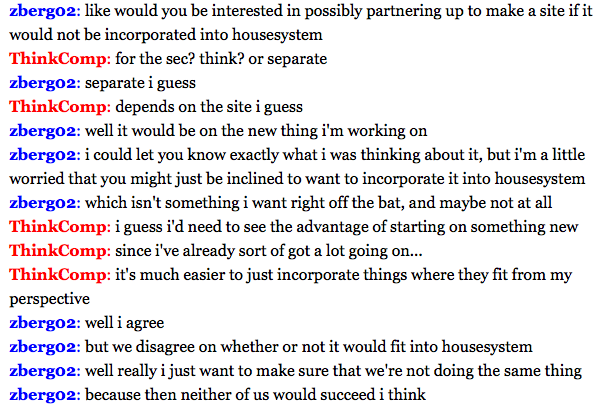Aaron Greenspan, a programmer and web entrepreneur who was a contemporary of Mark Zuckerberg’s while the two were students at Harvard University, has released a new batch of instant message conversations that allegedly took place between himself and Zuckerberg in 2004.
Though Greenspan has been less recognized in the press than the Winklevoss twins, he is not new to claiming that he has been neglected for his role in the founding of what is currently the largest social network in the world.
Greenspan has alleged for years that Mark Zuckerberg may very well have cribbed many ideas for what ultimately became Facebook from projects that were pioneered by Greenspan. While at Harvard, Greenspan created a social networking service called houseSYSTEM, which had a feature called “Facebook.”
In a blog post published today, Greenspan released not-before-seen IMs that he says contain “some of the most important legal evidence regarding the origins of Facebook, Inc. that I had been trying to find for years.” He says he uncovered them last week while digging through old computer files.
You can read them all here, here, here, here and here. Business Insider has been especially good at covering the messages in more detail here and here.
Arguably the most relevant bit is here, where Zuckerberg discusses partnering with Greenspan:
Overall it’s a complicated situation, assuming that the new IMs are not fabricated. Zuckerberg has not responded to this latest release, but he has never denied the veracity of Greenspan’s documents in the past, unlike, say, he came out aggressively against Paul Ceglia’s claims.
Put a lawyer where your mouth is
 Greenspan may indeed decide that he now has the evidence needed to pursue a fresh legal claim about the founding of Facebook. But as for now, his settlement with Facebook from 2009 is his last on-the-books interaction with the company. Since then, it’s been only verbal allegations, blog posts, and e-books. Greenspan himself writes that the only thing he says this new batch of IMs proves is that:
Greenspan may indeed decide that he now has the evidence needed to pursue a fresh legal claim about the founding of Facebook. But as for now, his settlement with Facebook from 2009 is his last on-the-books interaction with the company. Since then, it’s been only verbal allegations, blog posts, and e-books. Greenspan himself writes that the only thing he says this new batch of IMs proves is that:
“Mark is no genius. He’s your common, everyday megalomaniac, incapable of empathizing with those he repeatedly draws in close and then hurts. He may, in fact, be the greatest con of all time, having effectively convinced an entire nation, including the President of the United States, to believe in his extremist philosophy of radical openness.”
Perhaps Zuckerberg will get his comeuppance, Greenspan hypothesizes, as Wall Street comes to realize his true nature. But there’s no further indication that Greenspan is personally going to move forward with an actual legal claim over Facebook’s origins.
The media equation
In his blog post today, Greenspan calls out TechCrunch and other media outlets for supposedly ignoring his claims over the years while publishing “articles of questionable veracity” about the origins of Facebook.
To be clear: TechCrunch has covered many allegations about who should be credited for Facebook’s inception, from the Winklevosses to Ceglia. In fact, we’ve also covered Greenspan — both his entrepreneurial pursuits and his filed copyright claims about the term “Facebook”. With him, though, there have been no real legal actions taken in recent years against Zuckerberg or his company beyond the trademark claim which was settled in 2009. Otherwise, he’s only filed a claim against Accidental Billionaires author Ben Mezrich for his fictional account of Facebook’s inception, a suit which was later thrown out of court.
The truth is, if we wrote a story every time we came across a fresh allegation against a company or an executive from a former acquaintance (and trust me, our tips line is always filled with juicy bits) our daily post count would be even more crazy than it already is.
Tell it to the judge
Until people are willing to stand behind their claims in court, there is often no story. And even when there is a lawsuit filed, we reach out to get comment from both sides before hitting the publish button.
This situation is starting to remind me of an old friend who would talk incessantly about her employer’s neglect in paying long overdue wages. I listened intently for a while, but at a certain point, I figured that until she filed a legal claim, I’d have to start tuning out the constant complaints.
If someone feels so intensely that they’ve been wronged, and repeatedly bringing the misdeeds to the perpetrator’s attention doesn’t change his or her behavior, the “victim” should file a lawsuit. Enough with telling the details to everyone else. Tell it to the judge.
“Ask yourself why nobody is agreeing with you”
Greenspan often aligns himself with others who he says have been similarly wronged by Zuckerberg. Over the years he has pointed to a number of high-profile people in tech including Mark Zuckerberg’s sister Randi (who he incorrectly labeled in his most recent blog post as a current employee of Google) as those who have also been used and abused by the leader of the Facebook flock.
But the reality is, when contacted about the situation, none of these folks are interested in being associated with Greenspan or his claims. The consensus among industry notables is that Greenspan needs to get over his issues and move on.
I can’t help but notice how that sentiment mirrors one of my favorite pieces of real-world advice — a comment given by Secretary of State Hillary Clinton few years ago in response to a disgruntled employee of the State Department:
“You need to ask yourself why nobody is agreeing with you.”
Greenspan may indeed be telling the whole truth. He may indeed have a point that Zuckerberg’s treatment of him has not been fair and honest. But it’s clear that he’s a very intelligent and capable man with technical skills that are desperately in need at countless companies right here in Silicon Valley and beyond. Right now, it might be best for him to ask himself why no one is agreeing with him or jumping to his aid on the Facebook issue — and consider that it might be time to move on.

